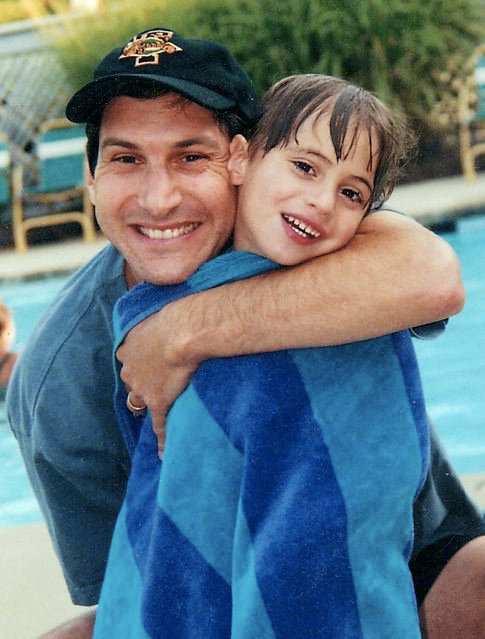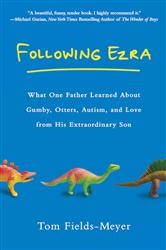Earlier this week, Tom Fields-Meyer wrote about reading and thinking about books and took a look at autism and God. He has been blogging here all week for the Jewish Book Council and MyJewishLearning.

Tom and Ezra
Not long ago, I had the pleasure of speaking at an event to benefit my children’s summer camp. In the midst of a lovely discussion, the rabbi who runs the camp offered a question: “What’s your book’s Jewish message?”
I stammered and stumbled a bit before I came up with an answer. But afterwards, I kept thinking about the question. I tend to come up with much more articulate responses the next morning, on my jog, than on the spot. (That’s why I’m a writer and not, say, a White House spokesman.)
Following Ezra tells the story of raising our middle son for the decade from his autism diagnosis at age three through the day of his one-of-a-kind bar mitzvah. It’s loaded with Jewish content: there’s the awkward, hilarious conversation he had with a neighbor on the walk to synagogue one Shabbat; there’s the wonderful conversation when Ezra learned about the
Eighth Commandment (the hard way); and of course there’s the last chapter, detailing the days surrounding my son’s bar mitzvah celebration.
But what’s the Jewish message?
In the book of
Genesis, it says God created human beings in God’s image. That means we should treat every person with dignity, respect and honor — no matter their disability, no matter what they look like, no matter how many times they remind us when the next Pixar movie is premiering (a habit of Ezra’s that can be either endearing or annoying, depending on your perspective). That also means that encountering people who are different from us — from different backgrounds, different circumstances, or facing different challenges — gives us a insight into the many aspects of the divine.
My book begins with an epigraph, a single
bracha, a traditional blessing. Jewish liturgy is full of blessings recited on various occasions. Most Jews are familiar with the blessings said over wine or before eating bread. One of my favorite pages in the
Artscroll prayer book lists
“Blessings of Praise and Gratitude,” the
brachot that are reserved for life’s unusual encounters. There’s one for seeing lightning, and one for experiencing an earthquake. There’s a particular blessing to say when you see
600,
000 people in once place. (How often do you get to use that one?)
In the midst of that list, the prayer book includes a blessing to say upon seeing a person who is different. The Talmud enumerates the various kinds of people included. It praises God, mishaneh habriyot—who “creates variety among living beings.”
Blessed is God for creating all kinds of people. What better words could introduce a story about raising a child with an unusual and fascinating mind?
And what better Jewish message could there be?
Tom Fields-Meyer is the author of Following Ezra. A former senior writer for People, he has written for dozens of publications, including The New York Times Magazine and The Wall Street Journal.




